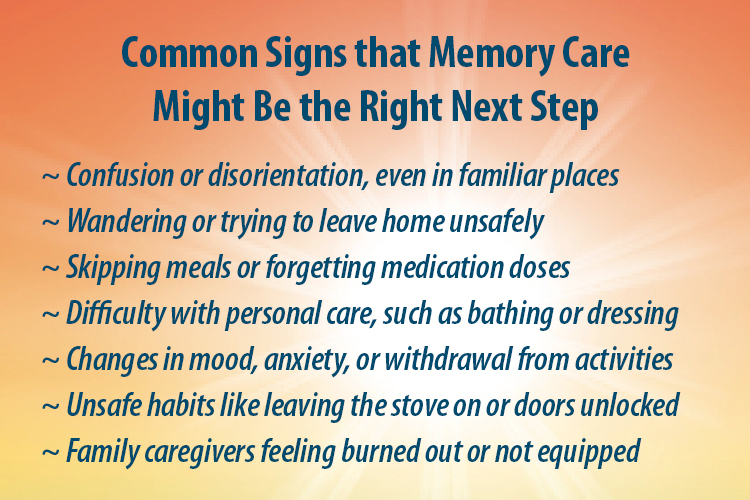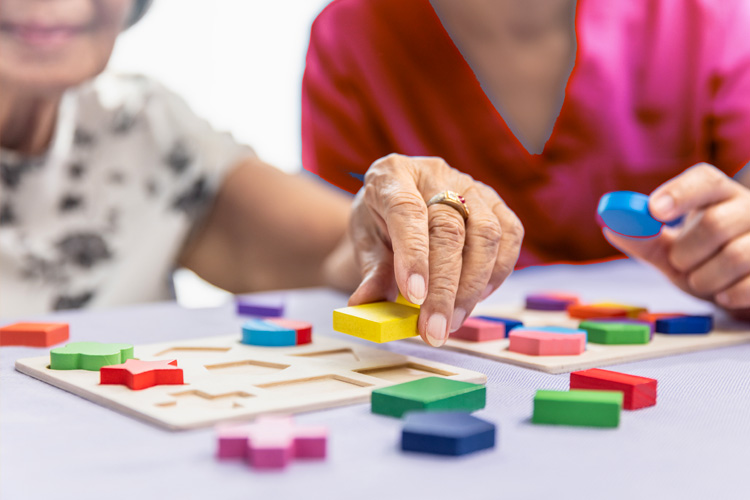When memory loss begins to affect daily life, families often ask an important question: Would my loved one be safer and happier in a memory care community? In Colorado, this decision is shaped by specific regulations that define what licensed memory support communities can provide. At Cappella of Grand Junction, we help families understand those guidelines and determine what setting offers the right blend of safety, comfort, and independence.
What Is Memory Support?
Memory support, sometimes called memory care, is designed for people living with Alzheimer’s disease, dementia, or other cognitive changes. These specialized neighborhoods combine 24-hour support, secure access, and a calming environment where residents can live with purpose and dignity.

At Cappella of Grand Junction, memory support is not just about safety, it’s about connection. Each day is structured around routines and activities that help residents feel confident and engaged. Whether it’s listening to familiar songs, participating in a craft, or sharing a story from years past, interactions are guided by respect and understanding.
Our care partners receive ongoing dementia-specific training so they can respond with compassion and patience. Lighting, layouts, and décor are designed to reduce confusion and promote comfort, helping residents find peace in their surroundings.
When to Consider Memory Support
Deciding when to consider a memory care community for a loved one is often one of the hardest choices a family faces. The need rarely appears all at once; it usually builds over time. You may notice small changes that slowly begin to impact safety, health, or quality of life.

Common signs that memory care might be the right step include:
- Confusion or disorientation, even in familiar places
- Wandering or trying to leave home unsafely
- Skipping meals or forgetting medication doses
- Difficulty managing personal care, such as bathing or dressing
- Changes in mood, anxiety, or withdrawal from activities
- Unsafe habits like leaving the stove on or doors unlocked
- Family caregivers feeling burned out or unable to keep up with supervision
If several of these signs sound familiar, it may be time to explore memory support. These communities offer consistent structure, compassionate care, and an environment where both residents and families can feel at ease.
According to the Alzheimer’s Association, more than 6.9 million Americans are living with Alzheimer’s disease. Early intervention through structured programs and trained caregivers can help reduce stress and maintain a stronger sense of self and security.
What Qualifies an Older Adult for Memory Support?
In Colorado, assisted living and memory care communities are regulated under the same state licensing system. However, memory support neighborhoods must meet higher standards for safety, staff training, and supervision. These rules help determine the right level of care for each resident’s cognitive and physical needs.
When memory support is usually appropriate
An older adult typically qualifies for memory care when they:

- Have been diagnosed with Alzheimer’s disease or another form of dementia
- Need reminders or step-by-step help with activities of daily living
- Experience disorientation or wandering that creates safety risks
- Benefit from a secure environment with consistent caregivers
- Show moderate changes in behavior, memory, or mood
- Thrive in a setting with structure, routine, and engaging programs
In these cases, memory care helps restore a sense of calm and stability while reducing stress for family caregivers.
When memory support may work with added coordination
Sometimes, residents with more complex needs can still live comfortably in memory support if the right systems and partnerships are in place. These situations are reviewed individually and may include:
- Transfer assistance and fall management
- Assistance with specialized diets
- Oxygen use that complies with community safety standards
- Catheter or ostomy care managed with outside clinical support
- Monitoring and treatment for early-stage, stable skin concerns
At Cappella of Grand Junction, care plans are customized through collaboration between nurses, care partners, and families. This team-based approach helps us tailor care for each resident, balancing independence with comfort and dignity.
When memory support is not the right fit
There are some situations where medical or behavioral needs go beyond what memory support can safely provide. In these cases, a higher level of care such as skilled nursing is the best option for maintaining health and safety.
Memory care is not designed for individuals who:
- Require 24-hour skilled nursing for treatments like IV therapy, ventilator, or tracheostomy care
- Have wounds or conditions that need daily clinical attention
- Are unable to assist with transfers or positioning
- Exhibit behaviors that pose ongoing safety risks
- Need hospital-level medical oversight or continuous monitoring
When these circumstances arise, the Cappella team partners with families to assist with a smooth transition to a more suitable setting, helping loved ones remain cared for and supported at every stage.
Understanding the BIMS Assessment
The Brief Interview for Mental Status (BIMS) is one of the tools used in senior living to understand how memory changes may affect daily life. It’s a short, conversational assessment that helps determine which level of care is most supportive.
The BIMS measures attention, recall, and orientation, with scores ranging from 0 to 15. The results are used as part of a larger picture, not as a diagnosis.
- 13–15: Mild or no cognitive changes, often suitable for assisted living. Find out who qualifies for assisted living.
- 8–12: Moderate cognitive changes that may benefit from memory support.
- 0–7: Significant changes, where memory care or skilled nursing provides more safety and consistency.
At Cappella of Grand Junction, BIMS is never used in isolation. It’s combined with insights from health evaluations, family discussions, and daily observations to identify the environment that will support each person to live comfortably and confidently.
Memory Support at Cappella of Grand Junction
Every person’s story is unique, and so is the care they deserve. At Cappella of Grand Junction, we take time to get to know each resident — their favorite music, daily routines, and what helps them feel most at home.

Our memory support neighborhood includes private apartments, shared dining spaces, and 24-hour care from a compassionate team trained in dementia-specific approaches. Residents enjoy chef-planned meals, wellness and activity programs, and sensory-based engagement that encourages connection and joy.
Families remain a vital part of life here. We welcome visits, participation in events, and open communication, helping loved ones stay connected and involved. When a resident’s needs change, we guide families through transitions thoughtfully and with care, maintaining continuity and comfort every step of the way.
If you’re exploring whether memory care or memory support could be the right choice for your loved one, we invite you to reach out. Schedule a tour, ask questions, and see firsthand how Cappella of Grand Junction provides compassionate, personalized care for those living with memory loss.




